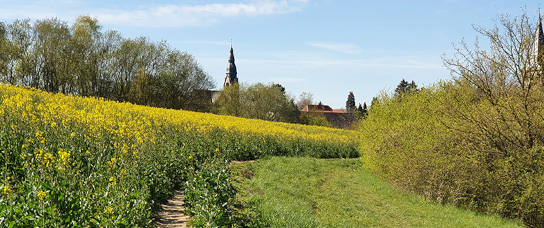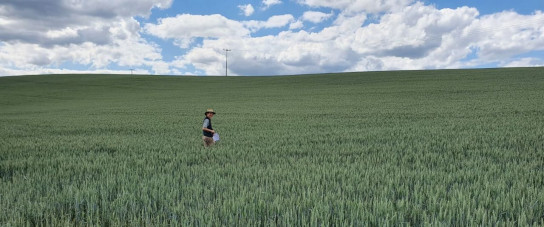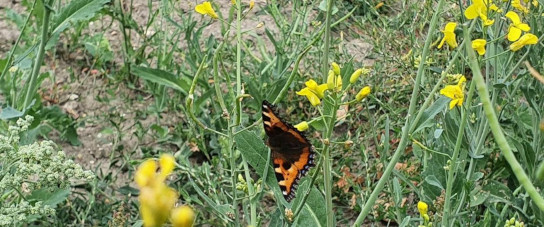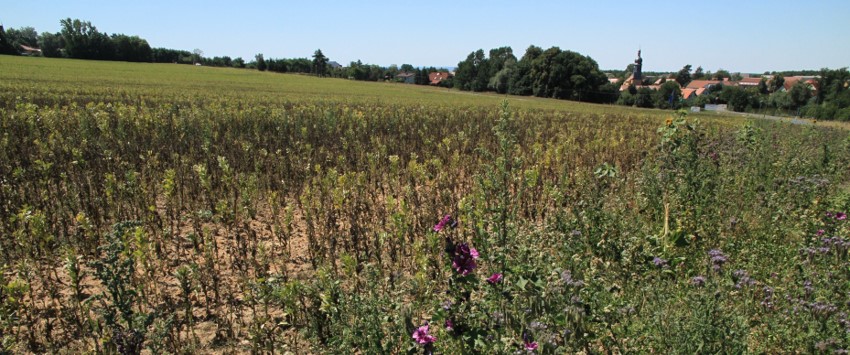Agriculture & Ecosystems

Our mission
Our group focuses on how agricultural and environmental policies affect both people and nature. We study how they influence farmers’ well-being and actions as well as biodiversity and ecosystem health in agricultural landscapes. We want to understand how agricultural systems work at both societal and ecological level, and find out how they could be made more sustainable. Throughout, we want to deliver scientific knowledge that can have an impact on policies and practices.
Key approaches and methods:
- Individual-based and agent-based simulation models
- Statistical policy (impact) analyses using geospatial and temporal data
- Knowledge-syntheses (literature reviews, workshops, interviews, online surveys, expert involvement)
- Interviews, e.g. with farmers and policymakers
- Direct interactions with decision-makers, e.g. ministries, DGs (science-policy interfacing)
- Analyses of field data, especially Citizen Science data
Agriculture & Ecosystems hub members
Dr. Guy Pe'er (Group leader Agriculture & Ecosystems)
Dr. Elizabeth Finch (Post-doc, project Agroecology-TRANSECT)
Linn Schaan (PhD student, Agroecology-TRANSECT)
Daniel Vedder (PhD student, CAP4GI)
Lea Kolb (PhD student, CAP4GI)
Maria Moosdorf (project assistant, agriDiv / Agroecology-TRANSECT)
Marco Matthies (technician, CAP4GI)
Sameer Khatri (intern, ETC-BE / LAFERIA)
Current Projects:
CAP4GI

Leverages and potentials in the Common Agricultural Policy for improved support of Green Infrastructure, biodiversity and ecosystem services
Daniel Vedder, Marco Matthies, Lea Kolb | Alumni: Lea Kahoun, Judith Rakowski
In CAP4GI (CAP for Green Infrastructure), we want to find out how the CAP (beyond agri-environment schemes) affect the work of farmers in Germany and how economically and ecologically useful they are. To do so, we use a two-stage computer model to explore how the policy context affects farmers’ decisions and thus shapes the agricultural landscape, and how this subsequently affects biodiversity and ecosystem services.
agriDiv formerly iCAP-BES

Impacts of the Common Agricultural Policy on Biodiversity, Ecosystem Services and People
Guy Pe’er, Maria Moosdorf, Linn Schaan | Alumni: Carla Cerda, Judith Rakowski
The aim of iCAP-BES is to facilitate a shift from identifying problems to designing and promoting solutions for improving farmland biodiversity, ecosystem services, and rural societies in Europe. Specific objectives are to 1) assess the CAP’s impacts on nature and people, 2) identify and evaluate cascading effects of the CAP in Europe and globally. And 3) engage in a close dialogue with policy makers and societal actors to enhance the uptake of existing and generated knowledge for a more sustainable CAP.
Agroecology-TRANSECT
Promoting a transition to more agroecological farming systems within the current and future policy framework
Elizabeth Finch, Linn Schaan, Marius Munschek, Maria Moosdorf, Guy Pe'er
The project aims to enhance the understanding of agroecological practices, to increase their uptake by European farmers. Within the project, the UFZ team investigates the impacts of the CAP on agroecology, the barriers and opportunities of agroecological transformations, as well as how different monitoring strategies can help improve our knowledge on the environmental impacts of agroecology. We investigate the policy framework, especially the CAP, to develop recommendations on how EU policies could support the scaling up of agroecology as one set of solutions to sustainability challenges in agriculture.
UFZ Platform Project - Sustainability impacts of the European Agricultural Policy

Guy Pe’er, Elizabeth Finch, Linn Schaan, Daniel Vedder, Lea Kolb
As part of the UFZ Platform Project “Governing transformations towards sustainable agrifood systems, subproject 3 focuses on facilitating better uptake of scientific knowledge into EU policies, especially the CAP, to enhance agrifood sustainability. Specifically the project aims to develop recommendations for better uptake of science in the CAP‘s design and implementation. Project tasks are to:
1) synthesise existing recommendations from science and assess their inclusion so far in the CAP; 2) develop new recommendations for short, medium and longer terms; and 3) enhance further knowledge synthesis and science-policy interactions regarding relevant EU policies.
Past Projects:
Birds@Farmlands
Developing tools to support farmland bird conservation in the EU
Judith Rakowski, Guy Pe'er
Conservation Schemes for the Northern Lapwing and the Grey Partridge
GrazeLIFE
Grazing for wildfire prevention, ecosystem services, biodiversity and landscape management
Julia Rouet-Leduc
Selected Publications
Published/in press publications
Hering, D., C. Schürings, F. Wenskus, K. Blackstock, A. Borja, S. Birk, C. Bullock, L. Carvalho, M. Bou Dagher-Kharrat, S. Lakner, N. Lovrić, S. McGuinness, G.-J. Nabuurs, A. Sánchez-Arcilla, J. Settele, & G. Pe’er (2023) Ensuring success for the EU’s Nature Restoration Laws. Science 382, 1248-1250.
Pe’er, G., J. Kachler, I. Herzon, D. Hering, A. Arponen, L. Bosco, H. Bruelheide, M. Friedrichs-Manthey, G. Hagedorn, B. Hansjürgens, E. Ladouceur, S. Lakner, C. Liquete, M. Quaas, M. Robuchon, D. Saavedra, N. Selva, J. Settele, C. Sirami, N. M. van Dam, H. Wittmer, E.R. J. Wubs, and A. Bonn (2023) Scientists support the EU’s Green Deal and reject the unjustified argumentation against the Sustainable Use Regulation and the Nature Restoration Law. Open letter (Full Version, 9.7.2023). Doi: 10.5281/zenodo.8033784
Pe’er, G., J.A. Finn, M. Díaz, M. Birkenstock, S. Lakner, N. Röder, Y. Kazakova, T. Šumrada, P. Bezák, E.D. Concepción, J. Dänhardt, M.B. Morales, I. Rac, J. Špulerová, S. Schindler, M. Stavrnides, S. Targetti, D. Viaggi, I.N. Vogiatzakis, H. Guyomard (2022) How can the European Common Agricultural Policy help halt biodiversity loss? Recommendations by over 300 experts. Conversation Letters. https://doi.org/10.1111/conl.12901
Rouet-Leduc, J., Pe'er, G., Moreira, F., Bonn, A., Helmer, W., Shahsavan Zadeh, S.A.A., Zizka, A. & van der Plas, F. (2021) Effects of large herbivores on fire regimes and wildfire mitigation. Journal of Applied Ecology, 58, 2690-2702. https://doi.org/10.1111/1365-2664.13972
Pe'er, G., Bonn, A., Bruelheide, H., Dieker, P., Eisenhauer, N., Feindt, P.H., Hagedorn, G., Hansjürgens, B., Herzon, I., Lomba, Â., Marquard, E., Moreira, F., Nitsch, H., Oppermann, R., Perino, A., Röder, N., Schleyer, C., Schindler, S., Wolf, C., Zinngrebe, Y. & Lakner, S. (2020) Action needed for the EU Common Agricultural Policy to address sustainability challenges. People and Nature, 2, 305-316. https://doi.org/10.1002/pan3.10080
Pe'er, G., Zinngrebe, Y., Moreira, F., Sirami, C., Schindler, S., Müller, R., Bontzorlos, V., Clough, D., Bezák, P., Bonn, A., Hansjürgens, B., Lomba, A., Möckel, S., Passoni, G., Schleyer, C., Schmidt, J. & Lakner, S. (2019) A greener path for the EU Common Agricultural Policy. Science, 365, 449-451. 10.1126/science.aax3146
Candel, J., S. Lakner, and G. Pe’er (2021) Europe’s reformed agricultural policy disappoints. Nature 595, 650 (correspondence)
